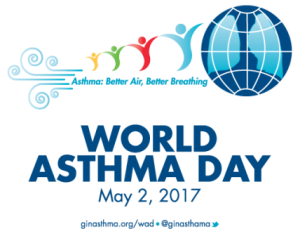15 million Nigerians have asthma – Thoracic Society
-
Nigeria marks World Asthma Day
No fewer than 15 million Nigerians have asthma, a chronic disease of the lungs, the Nigerian Thoracic Society (NTS) said as the country joined the rest of the world on May 2 to mark the 2017 World Asthma Day.
The Secretary-General of the society, Dr Olufemi Adewole, disclosed this in a presentation at the launch of the “Guideline for Asthma Management in Nigeria’’ on Tuesday in Lagos.
The World Asthma Day is an annual event organised by the Global Initiative for Asthma (GINA) and other partners globally to improve asthma awareness and care. The theme for 2017 is “Asthma — Better Air, Better Breathing’’.
Adewole, a specialist in pulmonary and internal medicine at the Obafemi Awolowo University Teaching Hospital Complex said: “Asthma is one of the most common chronic lung diseases affecting approximately 400 million people worldwide. In Nigeria, about 15 million people may have asthma based on numerous studies.
“However, with increasing urbanisation and uptake of western lifestyle, it is projected that developing countries may have rising incidences of asthma.The number of people with asthma will grow by more than 100 million by 2025’’.
He described asthma as the most common chronic lung disease in children. According to him, the disease is typically characterised by recurring symptoms such as coughing, wheezing, shortness of breath and chest tightening.
“These symptoms are variable and could fluctuate for each individual over time. Asthma is a heterogeneous disease with interplay of the nature and nurture,’’ he said.
Speaking on the National Guideline on Asthma Management, Prof. Peters Etete, President of NTS said the lack of a national guideline has remained a major gap in asth,a care in the country.
“Such a guideline is important to ensure that practitioners adopt the minimum level of standards required in asthma and see how such care is comparable to international best practices. This will ultimately reduce asthma related deaths and morbidity,’’ he said.
The society called on the Federal Government and the private sector to assist in ensuring access to clean, affordable cooking energy such as gas or electricity.
“Cooking with biomass should be minimised and when used, should be situated outside the main house in a place where air can flow freely.
“We should wage war against cigarette smoking, provide services to help current smokers quit and prevent initiation into cigarette smoking.
“Owners of vehicles should use them responsibly and choose to walk short distances rather than drive.
“We all have to strive to make our air cleaner for improved health and better asthma control,’’ Etete said.
Facts about asthma
Asthma is a major noncommunicable disease characterized by recurrent attacks of breathlessness and wheezing, which vary in severity and frequency from person to person. Symptoms may occur several times in a day or week in affected individuals, and for some people become worse during physical activity or at night. During an asthma attack, the lining of the bronchial tubes swell, causing the airways to narrow and reducing the flow of air into and out of the lungs. Recurrent asthma symptoms frequently cause sleeplessness, daytime fatigue, reduced activity levels and school and work absenteeism. Asthma has a relatively low fatality rate compared to other chronic diseases.
- WHO estimates that 235 million people currently suffer from asthma. Asthma is the most common noncommunicable disease among children. Most deaths occur in older adults.
- Asthma is a public health problem not just for high-income countries; it occurs in all countries regardless of the level of development. Most asthma-related deaths occur in low- and lower-middle income countries.
- Asthma is under-diagnosed and under-treated. It creates substantial burden to individuals and families and often restricts individuals’ activities for a lifetime.
The causes
The fundamental causes of asthma are not completely understood. The strongest risk factors for developing asthma are a combination of genetic predisposition with environmental exposure to inhaled substances and particles that may provoke allergic reactions or irritate the airways, such as:
- indoor allergens (for example, house dust mites in bedding, carpets and stuffed furniture, pollution and pet dander)
- outdoor allergens (such as pollens and moulds)
- tobacco smoke
- chemical irritants in the workplace
- air pollution.
Other triggers can include cold air, extreme emotional arousal such as anger or fear, and physical exercise. Even certain medications can trigger asthma: aspirin and other non-steroid anti-inflammatory drugs, and beta-blockers (which are used to treat high blood pressure, heart conditions and migraine).
Urbanization has been associated with an increase in asthma. But the exact nature of this relationship is unclear.
Reducing the asthma burden
Although asthma cannot be cured, appropriate management can control the disease and enable people to enjoy a good quality of life. Short-term medications are used to relieve symptoms. Medications such as inhaled corticosteroids are needed to control the progression of severe asthma and reduce asthma exacerbation and deaths.
People with persistent symptoms must take long-term medication daily to control the underlying inflammation and prevent symptoms and exacerbations. Inadequate access to medicines and health services is one of the important reasons for the poor control of asthma in many settings.
Medication is not the only way to control asthma. It is also important to avoid asthma triggers – stimuli that irritate and inflame the airways. With medical support, each asthma patient must learn what triggers he or she should avoid.
Although asthma does not kill on the scale of chronic obstructive pulmonary disease (COPD) or other chronic diseases, failure to use appropriate medications or to adhere to treatment can lead to death.
Source: WHO
About author
You might also like
Dr. Niyi Tolu writes for NHO
Welcome to Dr. NIYI’S CLINIC, the medical world of Dr. Niyi O. Tolu, NHO’s new writer. A medical professional with passion for people and the promotion of good health, Dr.
Revealed! How excessive alcohol damages your organs
Causes memory loss, you may even forget your name You may become disoriented, delirious or suffer hallucinations, says Family Health Book According to medical experts, very moderate consumption of alcohol may
NAFDAC warns against illegal importation of syringes
The National Agency for Food and Drug Administration and Control (NAFDAC) has warned against importation of syringes from foreign countries, saying the act may kill local pharmaceutical industries. NAFDAC Director-General,








0 Comments
No Comments Yet!
You can be first to comment this post!